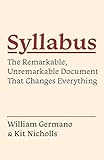Syllabus : the remarkable, unremarkable document that changes everything / William Germano & Kit Nicholls.
Material type: TextLanguage: English Publisher: Princeton : Princeton University Press, 2020Description: xxiii, 204 pages ; 23 cmContent type:
TextLanguage: English Publisher: Princeton : Princeton University Press, 2020Description: xxiii, 204 pages ; 23 cmContent type: - text
- unmediated
- volume
- 9780691192208 (hardback)
- 0691192200 (hardback)
- 378.1/99
- LB 2361 G373s 2020
| Item type | Current library | Home library | Collection | Shelving location | Call number | Copy number | Status | Barcode | |
|---|---|---|---|---|---|---|---|---|---|
 Libro
Libro
|
Biblioteca Juan Bosch | Biblioteca Juan Bosch | Humanidades | Humanidades (4to. Piso) | LB 2361 G373s 2020 (Browse shelf(Opens below)) | 1 | Available | 00000192885 |
Browsing Biblioteca Juan Bosch shelves, Shelving location: Humanidades (4to. Piso), Collection: Humanidades Close shelf browser (Hides shelf browser)

|

|

|

|

|

|

|
||
| LB 2353.62 M978f 2002 5 steps to a 5 : AP English language / | LB 2355 E24 2006 La Educación superior en el mundo 2007 : acreditación para la garantía de calidad : ¿Qué está en juego? / | LB 2360 H379v 2004 VAE : construire une professionnalisation durable : rapport d'étape / | LB 2361 G373s 2020 Syllabus : the remarkable, unremarkable document that changes everything / | LB 2361 R531b 2006 Blueprint for learning : constructing college courses to facilitate, assess, and document learning / | LB 2361.5 C291b 1993 The battleground of the curriculum : liberal education and american experience / | LB 2361.6 C912 1996 Creating an inclusive college curriculum : a teaching sourcebook from the New Jersey Project / |
Includes bibliographical references and index.
"The syllabus is one of the central documents of academic life, the one thing every teacher needs to write and every student needs to read. Most syllabi begin with a course description, a statement of what the course is about. But how do we get there? How will our students get there? And where is there? This book by William Germano and Kit Nicholls is a field guide to, and collegial chat concerning, this fundamental but often overlooked document. It describes how syllabi work and don't work, offers advice and encouragement to the professor trying to finish yet another syllabus, and reimagines our students' encounters with our syllabi by reconsidering our own relationship to them. Sampling syllabi from a range of disciplines across the sciences, social sciences, and humanities, Syllabus asks such questions as: what is a reading list, and what is it for? how do we build human time into the semester's clocktime? and can a syllabus be a living thing? Germano and Nicholls argue that at its heart, a syllabus is not really about what students have to know, or what the instructor will do, but what the students will do. A syllabus designed around doing is not only a faster and more effective way to move students toward knowledge, they contend, but also, importantly, an invitation into a community of practice-one that includes the students, the instructor, and countless others who will enter the classrom through readings, images, designs, and theories. Reimagining the syllabus as a sort of constitution-a founding document that creates a community out of a group of disparate individuals-they show that a syllabus is, above all, a privilege and a responsibility, as one of the few forms of writing that can quite directly call others to act"-- Provided by publisher.
There are no comments on this title.

